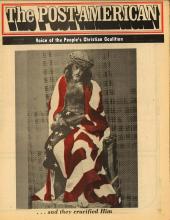The objective social-political-economic situation that exists in our country and the world at large today has determined a revulsion in large segments of the people. Liberation movements that span many classes can be found worldwide that are motivated by the blatant injustices of a concerted and organized fight by the established powers against any attempt at revolution from below. In our country two general responses to existing conditions can be seen. The predominant one has been a willing acceptance of values, needs and satisfactions that have been generated by a corrupt society that seeks to reproduce itself. This is voluntary servitude. A second response that is becoming more widespread is a rejection of this game that is rigged against us from the start. More people are refusing the hand-me-down values of bourgeois American society and rejecting co-option of practicality, participation, and success as defined by the society. They are refusing to adapt to the competitive ethic required for well-being under domination.
The Christian church has become invisible in the midst of these objective conditions. It has retreated to the reductionism of an exclusive personal and private ethic where individual purity has displaced responsibility and witness. The salvation of humanity has become a matter of fitting in, contentment, complacency, and in the end, captivity to the values and lifestyle of our culture. In making no recognizable difference between itself and our existing conditions, the church has tacitly become counter-revolutionary.
Read the Full Article

